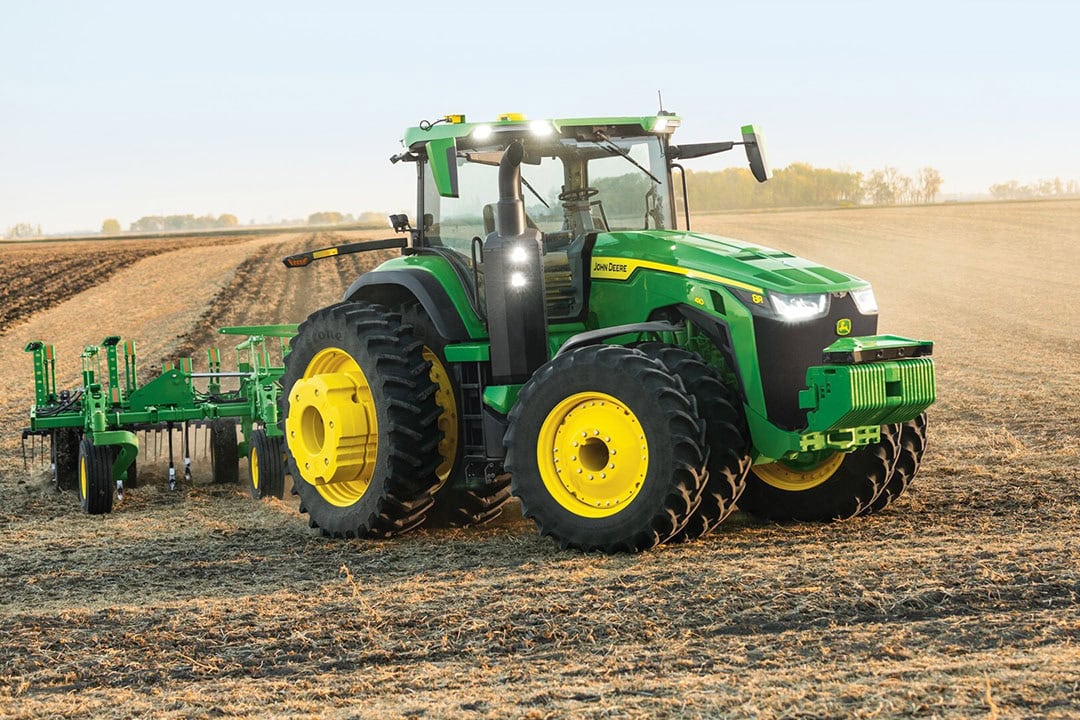The autonomous John Deere from a farmer’s perspective: Part IV

What do farmers think of the autonomous John Deere? What impact will it have on their farm? Future Farming asks farmers around the world. This week: British farmer Mike Hooper from Cornbury Farm.
Mike Hooper from Cornbury Farm thinks autonomy is the way forward. John Deere’s new autonomous tractor would fit into his farming system but he also likes the idea of running several field robots.
Mr Hooper runs a family farm of 1,600 hectares with his brother and his son in Salisbury Plain in the county of Wiltshire. “We’re growing around 400 hectares of cereals”, he explains. “Wheat, barley, marrowfat peas and grass feed are the predominant crops we grow. We do some contracting work as well. Combining, drilling, ploughing – all that sort of operations. End of February, beginning of March things will start getting busy with spring planting, first load of spreading and spraying.”
Autonomous tractors not yet allowed in the UK
Mr Hooper is certainly interested in what will happen with autonomous tractors in the UK. At this stage the use of these vehicles is not allowed. “But I have no problem with using the technology. We have great experience running GPS and very seldom we have problems with our tractors. GPS is very reliable.”
If you don’t require a driver on it, do you need the expense of building cabs?
Autonomy is going to be the way forward, Mr Hooper expects. But which way the technology will go, is uncertain, he says. “Will they redesign the concept of the tractor? If you don’t require a driver on it, do you need the expense of building cabs and all the infrastructure for having a man on the machine, like air-conditioning and all the rest of it? I’m not certain conceptionally that is the right way to be going.”
Field robot kinder to the soil
The farmer from Salisbury Plain is currently more attracted to using a field robot. “That’s a power unit that is purposely built for autonomous tasks.
We would be able to load it on a low trailer, transport it to the field and leave it to do its job. And if we can go lighter and smaller, we won’t be creating compaction. We would be kinder to the soil. It might be smaller, but you can just leave it to run 24 hours a day. You can do the same job in a day that a tractor would do in 8 hours.”
I think using smaller machines but more of them could work well
A field robot would be suitable for a range of tasks, Mr Hooper emphasises. “Field preparation, seed bed preparation, planting and probably spraying. But on our farm, we have to be able to easily load it on a trailer and transport it to another field. I think using smaller machines but more of them could work well.”
Text continues underneath image

Difficult to get workers
Mr Hooper thinks autonomy might help to solve the shortage of workers. “Of course, it has to be safe and not suddenly go through a hedge or a garden. But it is getting increasingly difficult to get workers on the farm. And staff in the industry is getting older. We are certainly watching this with interest. I might consider using an autonomous tractor five years down the line. I am always interested in new technology and things are moving fast.”
‘John Deere is a no-brainer’
Cornbury Farm currently runs tractors from three manufacturers; three John Deere tractors, one New Holland and one Valtra. When buying an autonomous tractor, Mr Hooper would prefer purchasing a John Deere. “They’re a manufacturer we know well and we have a dealership close by, right in the middle of our farm. Using John Deere is a bit of a no-brainer really. We currently run an 8R and so it would fit into our system. Cost has to be a consideration but it also has to be offset against labour. Time will tell.”
Join 17,000+ subscribers
Subscribe to our newsletter to stay updated about all the need-to-know content in the agricultural sector, two times a week.



